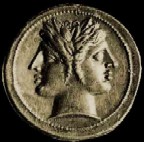
In March 2008, an international conference was held in
Athens on returning cultural property to its country of origin. The aim of this
conference was to study cases in which cultural property was successfully
returned, and the reasons why these cases succeeded.
The countries that participated in this conference also reflected on the ethical
and legal aspects of the issue, cultural diplomacy, museums and, finally,
international cooperation.
With rapid changes to society, it is important to define what cultural property
is before discussing its return.
If a broad culture is beneficial to all citizens, it is mandatory for those who,
through their profession, have an undeniable influence on large social groups.
This is the case in journalism, which has a major responsibility and which is
normally governed by a code of ethics, a sort of ideal of journalistic
integrity.
On this subject, an article was recently published describing reproductions of
archaeological pieces such as those found in museum boutiques as “…esoteric
statuettes made of terracotta.”
Such remarks, disseminated to thousands of citizens through mass media, attest
to the serious deviations caused by ignorance and a lack of broad culture.
And this ignorance, in appearance negligible, is in fact the source of
conflicts, hatred, stigmatisation, rumour and a whole series of conditions that
put civilization itself at risk by eroding the essential values on which it
depends for its very existence.
Without culture, there is no civilization.